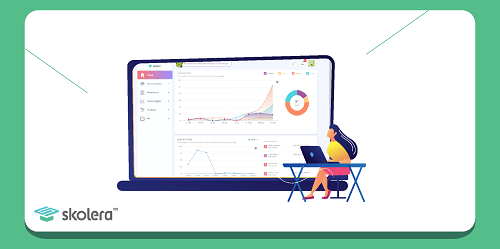School administration is a pivotal element for maintaining the morale and efficiency of school staff.
It’s what drives the performance of the school. More importantly, it’s a cornerstone for teachers, heads of departments, parents, and students.
The progress of any school goes back to its management. And the perfect school principal is the one who can best use human and material resources efficiently and effectively.
There are many schools that possess great financial and human resources. However, due to the lack of management experience, they haven’t reached their full potential.
That is why in this article we will cover everything you need to know about successful school management.
Get started Skolera for FREE
Table of Contents
1. What Is School Administration?
Modern school administration is the process of planning, organizing, managing, and supervising activities for an educational institution through the use of human resources and educational materials to achieve the teaching function efficiently and effectively.
In general, school administration includes conducting educational operations, starting from providing a safe educational environment until managing the school budget.

Moreover, duties of school administrator involve being responsible for various school administration tasks. If done right, they will lead to smooth and easy functioning of all matters in the school.
According to the book “Effective School Management,” school administration is as follows:
- Determining the desired goals
- Planning how to reach these goals
- Organizing the resources available to the school administration (human resources, time, and educational materials) in order to achieve the desired goals inexpensively
- Controlling the school administration process by measuring the achievements of the administration against the plan and taking risky measures when needed
- Defining and improving organizational standards for school management
That’s why a manger is someone who knows what they want to happen and make it happen. they are responsible for putting their school resources to good use.
Plus, they drive effective work environment and always look for improvement. Finally, they make it convenient for their employees to do their best and are responsible for everything they manage. Skolera YouTube videos guide you to how to do all this with only a few clicks.
2. What Are the Quality Standards of School Administration?
Focusing on the quality of school administration is a real game-changer. That’s because it draws a fine line between management success and failure.
There are several key quality standards that a school principal can study and take into account assessing his/her school management. Here are some:

2. 1. No Destination without Goals: Clarifying the goals of the school administration; the school principal sets clear definitions of the responsibilities of each actor within the educational institution that he/she administers
2.2. Democracy Wins: Making sure there is a real democratic system within the educational institution based on the foundations of understanding, knowledge, and mutual respect between employees and the school administration
2.3. Success Depends on Effort: Exerting much effort within school and unifying the efforts of all employees towards serving the educational process. This wat the school administration reaches the highest rates of success while taking into consideration money, time, and effort, according to Yasser Salama’s book “Modern School Administration,” 2003
2.4. Change Today Starts with Technology: A good school management software is one of the most important factors for strong school administration. It helps school supervisor in managing school and promotes successful school management. Further, it has the ability to manage the whole educational process
A school management system also provides safe means of communication between among school principal, school admin, teachers, students, and parents as well as other school personnel. As a school principal, you have a wide experience in management. You will find exchanging experiences with others is very valuable and rewarding
3. Elements of Developing School Administration
School management development is one of the most important features of successful school management. So here are the most important elements of developing a school administration. Let’s figure them out by asking the right questions, shall we?
3.1. What Is Your Vision for the School Improvement Plan?
Start your school management development plan with this question. The answer to this question may vary from the school principal to the teacher.
But it is important to have a clear long-term and near-term vision as well as clarify your own definition of school success. This definition will guide all of your next steps in developing and improving your school management.
3.2. How Do You Assess the Needs of the School Administration?
Create a comprehensive chart to assess your school’s strengths and weaknesses. This will help you use the school management program Skolera.
It will include student achievement, data, information for each semester, parents and teachers, and various and real reports on school performance.
3.3. Where Do You Start with Setting Your School Growth Goals?
Start by designing a strategy to advance and develop your school for the better and for what you should be, according to your plan and vision.
It is important that your plan includes precise, specific, and measurable targets achieved. This is the secret of success the success of modern school administration.
3.4. Is It Professional to Involve Everyone in Your School Management?
Research shows that strategies developed collaboratively have become more supportive and reliable and that more effective managers and leaders know how to listen to others. Here are some interesting facts on school management and education in Japan.
Here are some inspiring, intriguing, and thought-provoking ideas from Mr. Cowper, in his Ted Talk last June.
He tells us about the lessons he has learned from working with kids as a school principle for over 17 years. Developing and empowering your school does not go without empowering your students.
For this very reason he says “Never afraid to speak his truth he inspires open and honest dialogue with students, teachers and parents.”
And his 3 principles for engagement in school and to stay connected to children at school are as follows:
- Be playful
- Be present
- Be a coach
Therefore, it’s essential to involve all active parties of the educational process. That means teachers, administrators, students, parents, and others.
Engaging everyone around you is key to develop a school vision, set goals, and define action steps. More than anything else, ask your staff to express their opinions all the time and listen to what they have to say.
Join Skolera Now for FREE
3.5. Micro-Management vs. Macro-Management
This leads us to talk about micro-management vs. macro-management. Which is better for your school? There are definitely many pros and cons for both styles. Some educational leaders tend to do the latter due to many studies that support it.
However, providing that a school manager can give the support needed, motivate everyone, and reach goals, with the right technology, striking a balance between both styles is the way to go. If you’re looking for ways to make that easier, you’ll find your answer on Skolera YouTube.
4. What Are the Advantages of the Best School Management System?
- Modern technology based on cloud technology
- The availability of an academic calendar
- The availability of human resources and salary management within the school management system
- Easy to use for students, parents, and school administration, as well as teachers
- Easy access to student data
- The school management software should be able to integrate with various important add-ons to provide a more comprehensive solution that contains an integrated set of school needs and education management.
- Providing the ability to communicate with any or all parents and send notifications
- The school management software should have an online schedule and question bank
- The possibility of sending homework and reports
- Student assessments and the ability to record tasks online
- The ability to track fees and pay online
- School transportation administration
- The integration of the school management program with the necessary applications and programs
5. The 6 Rules of School Administration
School administration rules according to Evan Robb in his book “The Ten-Minute Principal: Free Up Your Time to Focus on Leadership“ are six. Evan developed these rules during his tenure as Principal and Assistant Principal for 20 years. School administration rules are:
- Having a vision
- Promote positive practical relationships within the school
- Confidence
- Efficiency
- Providing a student-centered environment
- Educational knowledge
These school administration rules help to create a positive environment in the school centered on values, respect, and audacity in making important decisions, communication, cooperation and acceptance of opinion among all parties.

The 6 pillars of school leadership – Book: The Ten-Minute Principal: Free Up Your Time to Focus on Leadership
Modern school management is always striving to create a positive environment within the school that supports development, rapid response to change, and continuous learning of all that is new in the field of education and management.
The principal’s support for strong, trustworthy relationships among school staff is extremely important.
A school principal, for example, encourages teachers to discover new ways to find time to collaborate with each other on developing educational experiences and projects, using educational technology, and the school management system.
As you clarify your expectations from teachers and give them enough confidence to play a constructive role in educational management, you will find a great commitment from them to the idea and strengthening the relationships between them and you and them.
Here are the most important school administration rules to strengthen relationships with teachers and students.
School Management Rules for Principals in Dealing with Teachers:
- Be a good listener and listen attentively to their opinions and problems rather than promptly respond
- Contact with them and transparently explain your expectations from them
- Be inside the school and make your office a place that is easily accessible and accessible to all
- Know your employees as unique people, each with his own life and his different nature
- Make your words and actions positive and determined
- Make transparency and honesty your motto
- Attend events at the school
School Management Rules for Principals Dealing with Students:
- Invest some time to get to know all the school students. Be especially present during breaks
- Praise outstanding students or students whose learning performance is developing specifically and explicitly when you notice this
- Praise students whose teachers indicate that their educational performance has improved positively
- Always help school students and try to make them feel that there is improvement in their school performance all the time
- Find different and varied ways in which students communicate with the school, either through the use of the school management software or through games and activities (have you heard about our awards from FinanceOnline? Check our article “Skolera Receives Two Awards From FinancesOnline“)
- Encourage teachers to show students artworks in the school building and in placements visible to everyone
- Provide formal ways that you can by listening to the views of the school students, whether through the activities of the school director with students or through meetings
6. Characteristics of Successful School Administration
How do we measure the success of a school administration? Is it determined by students enrollment? Good finances? Maybe it’s public relations or communication with parents. Or is it simply transparency?
The best way to measure the success of a school is listed in the following points:
- Continuous communication between successful school administration and parents
- Successful school management adopts accurate digital data and reports
- Excellence in school management
- Making tough decisions when needed
- Employing a good, easy to use school management system
- Professional innovation and development
Continuous Communication between Successful School Administration and Parents
Most successful school principals have the ability to communicate well. They are friendly and easy to deal with.
And their role is clear to everyone, that is, parents, students, teachers, or other school staff. This is in addition to being an active member of community in general!

You’ll find that the successful school principal always look for an opportunity to meet school students and their families and greet them in a personal capacity. Also their door is always open to everyone.
Successful school administration deals with parents not just as clients but also as primary partners in the educational process. Therefore, continuous communication between the principal and the families is essential.
In Skolera, we found that smart school administration means a lot of meetings, managing attendance and departure reports, and exam results through modern school management systems.
It goes without saying that this also includes informing parents about what is happening in the school and the various activities carried out by their children Skolera Youtube Channel explains how to do just that in detail.
Create Free Account
Successful School Management Relies on Accurate Digital Data and Reports
Modern school administration relies on reporting systems for all data of the educational system in an accurate digital way, so that the parties to the system can access these reports quickly and easily.
This video gives you an overview of the head of the department’s interface on Skolera. You can access it anytime and from anywhere to monitor and track the entire educational process.
The school administration relies on such data to anticipate future needs, evaluate the performance of teachers and students, and make future plans.
On the flip side, it’s easy to sometimes lose track of your children’s progress. That’s why a great SMS will include feature to involve the parents in the educational process.
This way they can view student data, performance, and posts published in their children’s class, keep up with their workload using only their mobile phone, and communicate with teachers.
Excellence in School Management
One of the factors of modern school management quality is that it has a vision and a goal: conceive or anticipate what it will achieve in 5 or 10 years from now! It is an attribute of a successful leader in any field, and not only in education.
In addition, successful school administration adopts transparency, “Honesty is the first chapter of the book of wisdom.” It is also the result of trust and must be a quality of every school leader.
Successful school administration excels in its ability to achieve maximum transparency, productivity, high efficiency, and continuous improvement of teaching methods, equipment, electronic systems, and facilities.
Modern smart software and systems help school management by reducing the time and effort necessary to manage the school and organize school data accurately.
Making Tough Decisions When Needed
An outstanding school principal has the wisdom and courage to make decisions that are difficult for anyone else to take.
Decision making in a school might concern managing budget and investing in new activities, or managing complaints by some teachers or parents, or making wise, tough, and prompt administrative commitment in times of crisis and disaster.
In these cases, the success of smart school administration clearly shows. All of this needs resolve, confidence, and wisdom to assess the situation from all sides, intervene at the time of need, and constantly announce status updates to reassure everyone.
Using a Good School Management System
Successful school management uses a school management system that can help it to manage the entire educational process, from students and teachers’ attendance record, and various daily reports as well as human and financial resources management to school services:
- Use of paper and pen is now unnecessary. The registration and review of the student attendance record is one of the great features of Skolera’s school management system. It allows you to create a different attendance report for each semester.
- Skolera’s school management system stores everything in one database, which you can view at any time. Thus, you can manage employees’ data effectively and efficiently.
- Skolera’s school management software assists successful school management in recruiting staff in appropriate departments. It also helps in recording their attendance, managing the payroll process, and viewing and printing any employee reports.

- School management software, Skolera, is equipped with the feature to quickly communicate with parents when needed. It serves as a link between parents, students, teachers, and the school admin. With Skolera you can post news, announce any school activities, send emails to individuals or groups, notify others via SMS, and create boards for discussion.
- Exam administration is one of the most important characteristics of successful school administration systems. Exams can be done online, administered, with the results evaluated and published on the system.
- The school principal can manage all school services: movement of cars or buses, operate school transportation, maintain records, collect transportation fees, and manage suppliers and office records, as well as keep stock updates of various educational materials and books.
- The school supervisor can also learn about student attendance data and reports, their behavior, place students in their classes, and easily register and collect school fees.
- Nowadays, school administration, with a state-of-the-art school management system, controls the workflow of the school’s financial management in a more organized, effective, and smooth manner.
Skolera school management system also facilitates payment processes and helps in the process of preparing salaries. It also helps modern school administration in calculating costs, preparing budgets, and creating a variety of financial statements and reports when needed.
Professional Innovation and Development
A smart school administration is constantly striving towards professional development. That’s why school managers employ teachers, department heads, and other school personnel.
Moreover, they support and encourage them in order to develop professionally to keep pace with the latest education practices and methods. It is important to encourage teachers and staff to be leaders and innovators in their respective fields.
Modern school administration also works to empower students and teachers and give them an incentive to be flexible and creative to think outside the box, preparing them for success.
Change is always fundamentally linked to the development of the educational process and school management. This change may be based on internal factors, i.e., from within the school or not, such as bad weather, crises, and disasters like the COVID-19 pandemic.
These external factors may sometimes compel us to deal with new goals and challenges that our schools have not faced before; no one really did!
But the art of successful school administration will inevitably help our students adapt with a renewed positive spirit, inspired by a new, better, and more advanced learning environment.
To follow up on the newest trends in education and learning management systems, check our blog on a regular basis. You can also know more about how to help manage your school through Skolera through our website.
Book FREE Live Demo Now
Resources:
- https://hbr.org/1974/09/skills-of-an-effective-administrator.
- https://thinkstrategicforschools.com/top-10-characteristics-21st-century-school-leaders/.
- Quality Middle School Leadership: Eleven Central Skills Areas by L. David Weller.
- Educational Leadership in Policy: Challenges and Implementation Within Europe edited by Ágúst Hjörtur Ingþórsson, Nikša Alfirević, Jurica Pavičić, Dijana Vican.
 Skolera LMS Blog Educational Technology Articles and News
Skolera LMS Blog Educational Technology Articles and News





